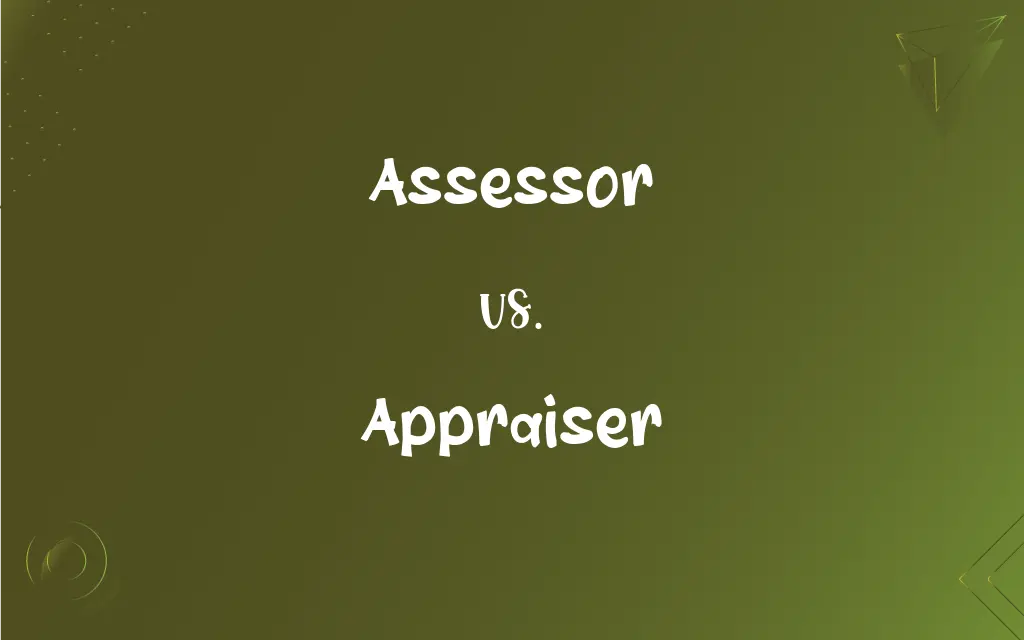Assessor vs. Appraiser: What's the Difference?
Edited by Aimie Carlson || By Janet White || Updated on October 2, 2023
An assessor determines the value of a property for tax purposes, while an appraiser estimates the market value of a property, typically for a sale or insurance.

Key Differences
Assessor and appraiser are both roles involved in evaluating the value of a property, but they serve different purposes. An assessor is a local government official who determines the value of a property for tax purposes. The value assigned by an assessor is used to calculate property taxes and is typically based on predetermined assessment standards and guidelines. An appraiser, on the other hand, is a professional who estimates the market value of a property, usually for buying, selling, or insurance purposes. The value determined by an appraiser is often based on market comparisons and property inspections.
Assessors are usually concerned with ensuring a fair and equitable value for tax purposes and often deal with a large number of properties in a jurisdiction. They are generally responsible for assessing the value of properties within a specific area or municipality. Appraisers focus on providing a detailed and individual valuation of a single property, based on its condition, location, and comparable properties. Appraisers are often hired by individuals, banks, or insurance companies to provide a detailed and specific valuation for a property.
The role of an assessor is often more regulatory, working under the guidelines and rules set by local governments. They are responsible for ensuring that the values assigned are consistent and equitable within the community. The role of an appraiser is more market-driven, and their evaluations are influenced by the current real estate market conditions, recent sales data, and individual property features.
While both assessors and appraisers need to have a deep understanding of property values and real estate markets, the scope and purpose of their evaluations differ significantly. Assessors play a crucial role in local government finance by providing the valuations used to calculate property tax, while appraisers are instrumental in real estate transactions, providing the market value estimations that are crucial in buying, selling, or insuring properties.
Comparison Chart
Purpose
Determines value for tax purposes.
Estimates market value for sale or insurance.
ADVERTISEMENT
Scope
Deals with many properties in a jurisdiction.
Focuses on individual property valuation.
Basis of Valuation
Predetermined assessment standards and guidelines.
Market comparisons and property inspections.
Role Nature
More regulatory and consistent.
More detailed and market-driven.
Employment
Typically employed by local governments.
Often hired by individuals, banks, or insurance companies.
Assessor and Appraiser Definitions
Assessor
An assessor is one who estimates the worth or quality of items or properties.
The county assessor annually reviews the value of properties in the area.
ADVERTISEMENT
Appraiser
An appraiser is a professional who determines the market value of a property.
The appraiser inspected the house and provided a detailed valuation report.
Assessor
An assessor is responsible for setting the value on which taxes will be owed.
The assessor set a higher value on the renovated properties.
Appraiser
An appraiser is a specialist who evaluates properties for transactions, loans, or insurance purposes.
The insurance company hired an appraiser to determine the value of the damaged property.
Assessor
An assessor is a person who works to ensure equitable value assignment for tax purposes.
The assessor worked diligently to ensure fair property valuations throughout the town.
Appraiser
An appraiser is one who assesses a property's value based on condition, location, and market trends.
The bank sent an appraiser to estimate the property's value before approving the mortgage loan.
Assessor
An official who evaluates property for taxation.
Appraiser
An appraiser is an expert in estimating the financial worth of a property or item.
The appraiser compared the property with recent sales to determine its market value.
Assessor
An assistant to a judge or magistrate, usually selected for special knowledge in a particular area.
Appraiser
An appraiser is a person who conducts evaluations to provide detailed and specific property valuations.
The appraiser's meticulous examination.
Assessor
One who assesses a property for tax or insurance evaluation.
Appraiser
To estimate the price or value of
Appraise a diamond.
Appraise real estate.
Assessor
(law) A specialist who assists the court in determining a matter.
Appraiser
To make a considered judgment about; assess or size up
Appraise a threat.
Appraised himself in the mirror.
Assessor
A civil servant entrusted with checking the veracity of data and criteria used by a taxpayer to complete a tax return.
Tax assessor
Appraiser
One who performs appraisals.
Assessor
One who assesses a project for cost evaluation.
Appraiser
One who appraises; esp., a person appointed and sworn to estimate and fix the value of goods or estates.
Assessor
An official responsible for student welfare.
Appraiser
One who estimates officially the worth or value or quality of things
Assessor
One appointed or elected to assist a judge or magistrate with his special knowledge of the subject to be decided; as legal assessors, nautical assessors.
Appraiser
One who determines authenticity (as of works of art) or who guarantees validity
Assessor
One who sits by another, as next in dignity, or as an assistant and adviser; an associate in office.
Whence to his Son,The assessor of his throne, he thus began.
With his ignorance, his inclinations, and his fancy, as his assessors in judgment.
Assessor
One appointed to assess persons or property for the purpose of taxation.
Assessor
An official who evaluates property for the purpose of taxing it
Assessor
An assessor is an official who evaluates properties for tax purposes.
The assessor determined the value of the property to calculate the annual property tax.
Assessor
An assessor is a governmental official who appraises the value of properties within a specific jurisdiction for tax assessment.
The assessor’s office is responsible for managing property value assessments and records.
FAQs
Is the Assessor’s valuation legally binding?
Yes, the valuation provided by an Assessor is usually legally binding for taxation purposes.
Can an Assessor work independently?
Typically, Assessors work for local governments, but some might work independently, depending on jurisdictional regulations.
What does an Appraiser do?
An Appraiser estimates the value of various types of properties, usually for sale, purchase, or mortgage transactions.
Is formal education important for an Appraiser?
Yes, Appraisers typically require formal education, licensure, and adherence to ethical standards, like those set by the Appraisal Foundation.
Can an Appraiser’s valuation influence mortgage loans?
Yes, an Appraiser’s valuation can significantly influence the amount, approval, and terms of a mortgage loan.
Can Appraisers work for insurance companies?
Yes, Appraisers can work for insurance companies to determine the value of items for insurance coverage or claims.
Do Assessors need knowledge of construction and architecture?
Yes, knowledge of construction, architecture, and local real estate markets is valuable for Assessors in valuing properties accurately.
Can an Appraiser be government-employed?
Yes, some Appraisers are employed by government agencies, but many also work independently or for appraisal firms.
Can an Assessor’s role involve analyzing tax rates?
Yes, Assessors often analyze tax rates and exemptions to determine property tax liabilities.
What is the primary role of an Assessor?
An Assessor's main role is to determine the value of properties for taxation purposes, often working for a government entity.
Do Appraisers focus only on real estate?
While many Appraisers specialize in real estate, others appraise various assets like art, jewelry, or equipment.
Do Assessors require specific qualifications?
Yes, Assessors usually need qualifications and certifications, which vary by jurisdiction, and often need knowledge of local property laws.
Are Assessors involved in tax collection?
No, Assessors are responsible for valuing properties for tax purposes, but they do not collect taxes themselves.
Is continual learning important for both Assessors and Appraisers?
Yes, staying informed about market trends, laws, and valuation methods is crucial for both Assessors and Appraisers.
Can an Appraiser’s valuation be used in legal cases?
Absolutely, appraisals are often used in legal proceedings, such as divorce settlements or disputes over estates or property values.
About Author
Written by
Janet WhiteJanet White has been an esteemed writer and blogger for Difference Wiki. Holding a Master's degree in Science and Medical Journalism from the prestigious Boston University, she has consistently demonstrated her expertise and passion for her field. When she's not immersed in her work, Janet relishes her time exercising, delving into a good book, and cherishing moments with friends and family.
Edited by
Aimie CarlsonAimie Carlson, holding a master's degree in English literature, is a fervent English language enthusiast. She lends her writing talents to Difference Wiki, a prominent website that specializes in comparisons, offering readers insightful analyses that both captivate and inform.
































































